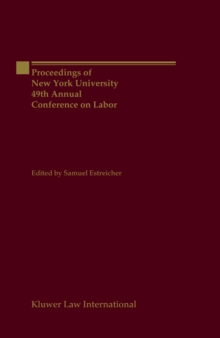
Employee Representation in the Emerging Workplace: Alternatives/Supplements to Collective Bargaining : Proceeding of New York University 50th Annual Conference on Labor PDF
Edited by Samuel Estreicher
Part of the Proceedings of New York University Annual Conference Series series
Description
Proceedings of New York University 50th Annual Conference on Labor
Private-sector unionization has been in a period of dramatic decline. While much scholarship has sought to explain this development and has called for stronger legal protection of union organizing efforts, the viability of alternative or supplementary forms of employee representation has received comparatively little attention. The potential for such alternatives and the appropriate role of public policy in this arena served as the theme for the 50th anniversary of New York University's Annual Conference on Labor. This long-standing conference brings together government officials; representatives of companies, labor unions, and employees; lawyers; and human resources specialists.
In this vital forum, participants discuss important themes in U.S. labor law affecting the American workplace and share new ideas and perspectives for improving the practice.
This latest installment includes conference papers and commentary as well as additional essays by professors at esteemed institutions in three different countries (Israel, Canada, and the United States). It addresses such provocative questions as:
- • What do workers want in the way of workplace representation?
- • What role has individualism played in the decline of unions in private companies?
- • Do labor laws unnecessarily restrict the potential growth of employee ownership?
Information
-
Download - Immediately Available
- Format:PDF
- Pages:756 pages
- Publisher:Wolters Kluwer
- Publication Date:01/01/1999
- Category:
- ISBN:9789041174963
Other Formats
- Hardback from £372.00
Information
-
Download - Immediately Available
- Format:PDF
- Pages:756 pages
- Publisher:Wolters Kluwer
- Publication Date:01/01/1999
- Category:
- ISBN:9789041174963










